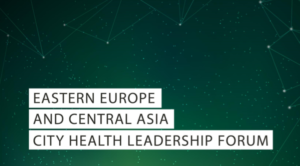 On the 6 December 2019, the EECA City Health Leadership Forum will be organized in Kyiv, Ukraine, showcasing the results of the Fast Track HIV/TB Cities Project (2017-2019)
On the 6 December 2019, the EECA City Health Leadership Forum will be organized in Kyiv, Ukraine, showcasing the results of the Fast Track HIV/TB Cities Project (2017-2019)
The Forum will focus on discussing the regional context, sharing successful HIV and Tuberculosis city response models and facilitating movement towards ending these diseases in Eastern European and Central Asian (EECA) cities. It will include a Mayors’ high-level panel discussion, presentations of successful city responses and innovation to fast-track cities to 90-90-90, which will feature the inclusion of key populations in the cities’ responses. The Forum will gather over 150 delegates from 20 countries of the EECA region, including 11 city Mayors.
The Fast-Track HIV/TB Cities Project
Launched on World AIDS Day 2014, the Fast-Track Cities initiative has grown to include more than 300 cities and municipalities that are committed to attain the UNAIDS 90-90-90 targets: 90% of all people living with HIV will know their HIV status; 90% of all people with diagnosed HIV infection will receive sustained antiretroviral therapy (ART); and 90% of all HIV-diagnosed people receiving sustained ART will achieve viral suppression.
Alliance for Public Health (Ukraine) together with AFEW International (The Netherlands), licit (Switzerland) and Stop TB Partnership under technical guidance of UNAIDS EECA office with funding of The Global Fund initiated the regional Fast-Track HIV/TB Cities Project. The project was implemented between 2017-2019 and developed efficient and sustainable city models of HIV/TB responses that would allow to reduce AIDS and TB mortalities in five project cities; Almaty (Kazakhstan), Balti (Moldova), Odesa (Ukraine), Sofia (Bulgary), and Tbilisi (Georgia).
Amsterdam was one of the first to sign the Paris Declaration in 2014 and has introduced a comprehensive health policy for key populations. AFEW International with expertise on increasing access to health services for HIV, TB and viral hepatitis for key populations, is well-connected to the Municipal Public Health Service and police in the Netherlands. This expertise was shared in two training courses and a study tour.
International best practice suggests that collaborative city level models have been most effective in reducing HIV and TB burdens. The first training series, ‘Collaboration between municipalities and civil society – models and realities’, were designed as an exchange and sharing of experience and best practices in successful models of municipality and NGO partnerships. Five integrated work meetings and counselling sessions with selected project city stakeholders from municipality, health and social sector, NGOs and key populations were conducted by licit and AFEW International and improved key populations’ service access through better collaboration between relevant city stakeholders – most importantly, between municipalities and NGOs.
The second training series on innovative municipality funding approaches planned exchanged and adapted such approaches and income generating activities. The training replicated successful practices in the project cities through learning from experiences in Amsterdam. During this training the best international practices of public-private partnerships at city level and private funding for key population programmes offered inspiration for the participants of the training.
During the study tour different partners of AFEW International shared models, experiences and activities that demonstrated successes and challenges in increasing access to health for key populations. Project partners from Almaty, Kyiv and Tbilisi were provided the opportunity to connect to civil servants and different health actors within the Netherlands and discuss initiatives to reach out to key populations to increase their quality of life. Furthermore, representatives of municipality, police and NGOs working with key populations elaborated on different forms of collaboration, to prove that the only way to eliminate HIV and TB is if municipality, police and NGOs work together.



